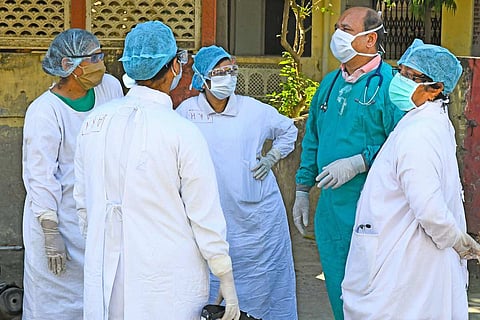

On May 29, a final year postgraduate student from the Department of Surgery at Osmania General Hospital (OGH) in Hyderabad was found to be positive for the coronavirus, causing a wave of fear among other doctors and staff at the hospital. The student, who had been studying for his upcoming exams, had been at the college hostel for around two months. Despite this, no measures were allegedly taken by the hospital administration to screen or test others for COVID-19. This comes at a time when several doctors continue to test positive for SARS-CoV-2, the virus which causes COVID-19.
Last week, the Telangana government had stated that at least 153 healthcare professionals had contracted SARS-CoV-2. In recent weeks, several doctors and staff at the Osmania General Hospital have alleged that administrators at the hospital have not implemented appropriate safety measures or protocols to protect those on the frontline of the fight against the coronavirus pandemic.
“In just the past week, at least 50 doctors have tested positive for SARS-CoV-2. There is no doubt that this is due to the lack of personal protective equipment (PPE) and other precautionary measures in the hospital,” says one postgraduate student from the hospital who has been doing routine shifts overseeing suspected COVID-19 patients in the hospital.
The student, who spoke on the condition of anonymity, stressed that the institution was not providing adequate testing for hospital staff.
“There’s significant lack of contact tracing and the administration is not taking enough efforts to contain the local outbreak within Osmania General Hospital and other affiliated hospitals,” he adds.
Doctors at OGH do not have specific COVID-19 duties like their counterparts at Gandhi Hospital, the dedicated COVID-19 hospital; individuals suspected to be positive for coronavirus are kept in isolation wards. General physicians (including the postgraduate students in this Department) oversee these patients and are at constant risk of exposure to the virus.
The hospital has introduced a new protocol wherein half the staff tending to patients with COVID-19 are asked to self-isolate at home for a period of two weeks. During this time, the remaining half of the staff is to care for the patients in these wards.
“Despite constantly highlighting our concerns to the Superintendent and Principal, there has been no change,” says the student.
“Many of the doctors and staff are being forced to work without proper PPE and are not even given masks. Less than half of the doctors are even being provided with PPE. Though there have been reports that there has been PPE donated from elsewhere, it has not been distributed and there doesn’t seem to be any information available as to what happened with it,” says Dr Vijeyendra, former chairman of the Telangana Junior Doctors Association (TJUDA), speaking with TNM.
No isolation facilities
Several other resident doctors at Osmania have raised a number of other safety concerns.
There has been no quarantine or isolation facility arranged by the administration which not only poses a risk to the staff tending to these patients, but also puts anyone they come in contact with at risk too, they allege.
“Symptomatic doctors and staff are being sent to Gandhi Hospital. However, for day scholar postgraduate students, they have to return home to their loved ones with the constant fear that they might get someone in their vicinity sick,” adds another junior resident doctor from OGH.
“Even asymptomatic persons who have tested positive have o opt for isolation on their own, there is no proper facility provided by the hospital.”
Further, doctors and staff have alleged that the PPE, provided just to a few medicos, is of questionable quality.
“The environment is already so compromised and this makes the work even more difficult for doctors,” says Dr Vijeyendra.
The hospital has also been accused of making no effort to increase testing capacity either. Many of the staff have complained that their results are given only three to four days after giving their samples.
“Our shifts are the same. Duty hours are as long as usual, but since we have half the staff working at any given time, it’s a lot more hectic than usual. The constant lack of essential equipment, including examination gloves and sterile surgical gloves, is adding to this tense environment. And even when I leave the hospital, there is a fear of what if I pass this on to someone else at home?” says another postgraduate student from the Surgery Department.
“My biggest fear is contracting the virus and bringing it home. My grandmother stays with us and her age and other health factors put her at risk of getting ill. It’s like constantly walking on eggshells, I can’t even begin to explain how scared I am,” she adds.
At the time of writing, TNM has reached out to the medical superintendent of OGH, who has yet to reply.
Update: The Osmania Hospital announced on Thursday that it would begin testing staff and doctors.